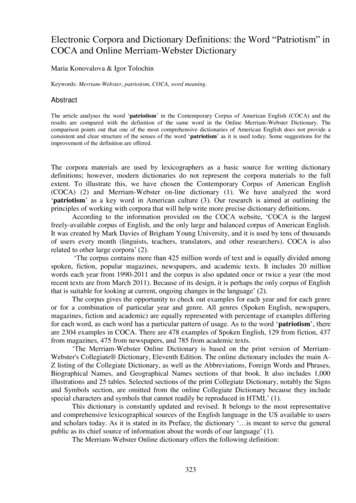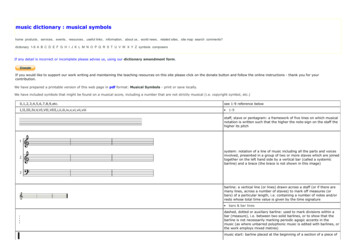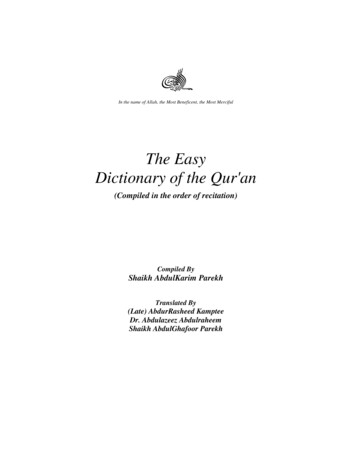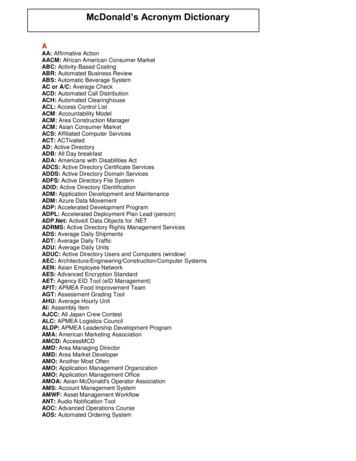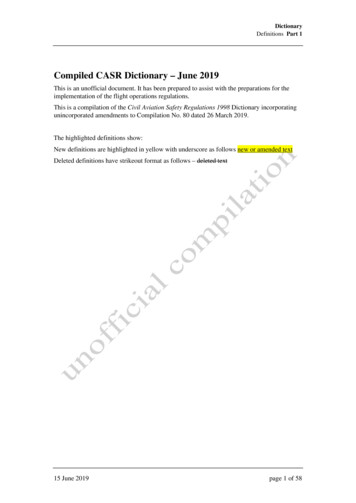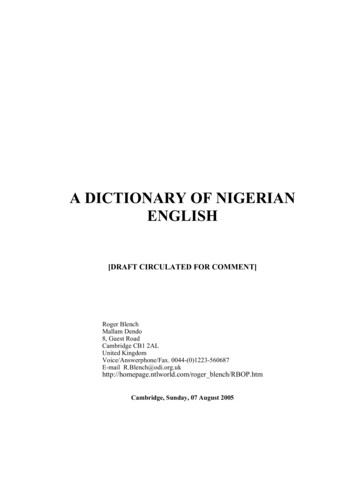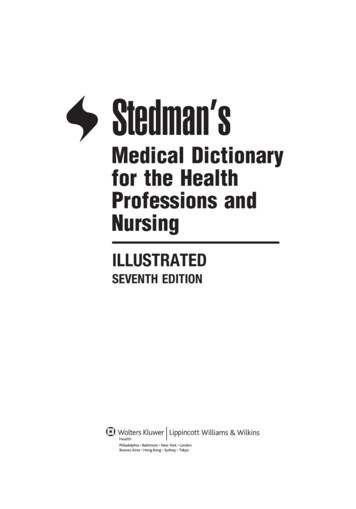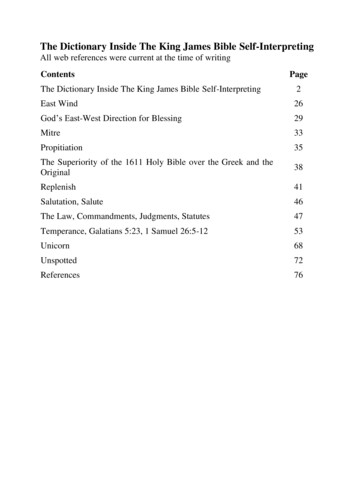
Transcription
The Dictionary Inside The King James Bible Self-InterpretingAll web references were current at the time of writingContentsPageThe Dictionary Inside The King James Bible Self-Interpreting2East Wind26God’s East-West Direction for Blessing29Mitre33Propitiation35The Superiority of the 1611 Holy Bible over the Greek and theOriginal38Replenish41Salutation, Salute46The Law, Commandments, Judgments, Statutes47Temperance, Galatians 5:23, 1 Samuel 26:5-1253Unicorn68Unspotted72References76
2The Dictionary Inside The King James Bible Self-InterpretingNote to Author of The Dictionary Inside The King James Bible by GailRiplingerDear GailThank you again for your ground-breaking work, hereafter referred to as TheDictionary. I have now finishing perusing that work, so I have forwarded below under the heading of Observations the complete set of my remarks withattached studies. I trust that they are helpful.Yours in the Lord Jesus ChristAlan O’RObservationsJustification FormatThis is a general comment but it’s apparent that the two-column arrangementof The Dictionary with full justification without hyphenation for each entrysometimes creates appreciable gaps between successive words. I’m wondering if left justification may be a more suitable format for individual entries, ifhyphenation is not to be used.I’ve inserted an example below taken from one of my own works entitled Biblical Bulwarks, on Britain’s Bible-based governance, showing that her formerEU membership was illegal and unconstitutional. Some of that work used textboxes, in which the contents were left justified with no hyphenation as you seewith the left-hand box below. The right-hand box has the same contents butwith full justification and no hyphenation, as in The Dictionary. I suggest thatthe left-hand box may read a little more easily.
3One of Magna Carta’s chiefarchitects was ArchbishopStephen Langton, d. 1228.Obedience to the Supreme Pontiffwas a sacred duty, but it could becarried into excessiveinterpretations. Stephen Langtonhimself, the Pope’s elect, was asgood an Englishman as he was aChurchman. He foresaw theunbridled exploitation byRome of the English Church (9)p 197. Langton got light from theBible. He introduced the Chapterdivisions in scripture (10) p 3,(11) p 295.One of Magna Carta’s chiefarchitectswasArchbishopStephen Langton, d. 1228.Obedience to the Supreme Pontiffwas a sacred duty, but it could becarriedintoexcessiveinterpretations. Stephen Langtonhimself, the Pope’s elect, was asgood an Englishman as he was aChurchman.He foresaw theunbridledexploitationbyRome of the English Church (9)p 197. Langton got light from theBible. He introduced the Chapterdivisions in scripture (10) p 3, (11)p 295.Two- Column WORD FormatIt appears, though, that excessive gaps between words using the two-columnformat in WORD can be reduced by means of hyphenation with left justification. See the example below.One of Magna Carta’s chief architectswas Archbishop Stephen Langton, d.1228. Obedience to the SupremePontiff was a sacred duty, but it couldbe carried into excessive interpretations. Stephen Langton himself, thePope’s elect, was as good anEnglishman as he was a Churchman.He foresaw the unbridled exploitationby Rome of the English Church (9) p197. Langton got light from the Bible. He introduced the Chapter divisions in scripture (10) p 3, (11) p 29In addition with respect to format, it may be useful for the sake of consistencyto convert the ' straight quote form of the apostrophe that results from copyingscriptures into the text into the usual Times New Roman ’ smart quote form.See definitions of adulterer, babbler, church etc.See Change straight quotes to curly quotes with Find and Replace1 for makingthe changes to a whole document.Examples of Biblical definitions of Biblical words follow.
4Biblical Definitions of Biblical WordsAlway, AlwaysEach term could have an individual entry in that alway is all the way and always is at all times. See The Language of the King James Bible p 84 and thesescriptures. The Exodus-Numbers passage is a good example of how crossreferencing helps with definitions i.e. with respect to “ words.which theHoly Ghost teacheth, comparing spiritual things with spiritual” 1 Corinthians 2:13.“For the cloud of the LORD was upon the tabernacle by day, and fire wason it by night, in the sight of all the house of Israel, throughout all theirjourneys So it was alway: the cloud covered it by day, and the appearanceof fire by night” Exodus 40:18, Numbers 9:16.“Let her be as the loving hind and pleasant roe; let her breasts satisfy theeat all times; and be thou ravished always with her love” Proverbs 5:19.AmenAmen could be included in The Dictionary in that the Biblical definition appears to be much stronger and vastly more authoritative than the Concise Oxford Dictionary definition So be it.“And Benaiah the son of Jehoiada answered the king, and said, Amen: theLORD God of my lord the king say so too” 1 Kings 1:36.CitizenThis term may be a useful addition to The Dictionary. See the following extract2.
5CitizensThe Biblical description of “citizen” shows that today’s believer is not to be ‘aglobal citizen’ of the devil’s emerging one-world kingdom of Revelation 13:34 “ and all the world wondered after the beast. And they worshipped thedragon which gave power unto the beast: and they worshipped the beast,saying, Who is like unto the beast? who is able to make war with him?” The term “citizen” occurs in Luke 15:15, 19:14, Acts 21:39 and in Ephesians2:19 as “fellowcitizens.”Acts 21:39 “But Paul said, I am a man which am a Jew of Tarsus, a city inCilicia, a citizen of no mean city: and, I beseech thee, suffer me to speak untothe people” is key in that it defines the term “citizen” as used in scripture asa city denizen or city dweller.The references in Luke 15:15, 19:14 would therefore apply to individuals wholived in “cities” Luke 19:17, 19 - though the definition could refer to a dwellerof a country, Luke 15:15, like a US citizen.Ephesians 2:19 “Now therefore ye are no more strangers and foreigners, butfellowcitizens with the saints, and of the household of God” is typified byActs 21:39 insofar as today’s believer can look forward to the fulfilment ofHebrews 12:22, 13:14, Revelation 21:2-3 “But ye are come unto mount Sion,and unto the city of the living God, the heavenly Jerusalem, and to an innumerable company of angels.For here have we no continuing city, but weseek one to come.And I John saw the holy city, new Jerusalem, comingdown from God out of heaven, prepared as a bride adorned for her husband.And I heard a great voice out of heaven saying, Behold, the tabernacle ofGod is with men, and he will dwell with them, and they shall be his people,and God himself shall be with them, and be their God.”For now, having “here.no continuing city” especially in that soon “the citiesof the nations fell” Revelation 16:19, today’s believer is subject to “the royallaw” James 2:83, which for every UK and Old Dominion resident is the AV1611according to The Coronation Oath. All such residents are therefore subjectsof HMQE2 under the AV1611. The condition for all subjects of HMQE2 now isexpressed by Paul: “Let every soul be subject unto the higher powers. Forthere is no power but of God: the powers that be are ordained ofGod.Wherefore ye must needs be subject, not only for wrath, but also forconscience sake.Put them in mind to be subject to principalities and
6powers, to obey magistrates, to be ready to every good work” Romans 13:1,5, Titus 3:1.A Biblical citizen via Ephesians 2:19 is of course forever subject to “the Lordof glory” James 2:1.Commune, CommuningThe Dictionary definitions are fine. I suggest though that the words have atwo-way prayerful connotation. That requires further study but note these references. That from Genesis is the first occurrence of any of the derivatives ofcommune and that from Exodus is the first such occurrence in that Book. Theemphasis on prayer is distinct in each reference.“And the LORD went his way, as soon as he had left communing with Abraham: and Abraham returned unto his place” Genesis 18:33 and context.“And there I will meet with thee, and I will commune with thee from abovethe mercy seat, from between the two cherubims which are upon the ark ofthe testimony, of all things which I will give thee in commandment unto thechildren of Israel And when Moses was gone into the tabernacle of thecongregation to speak with him, then he heard the voice of one speakingunto him from off the mercy seat that was upon the ark of testimony, frombetween the two cherubims: and he spake unto him” Exodus 25:22, Numbers7:89.ContensionThis word should be contention, as found in Proverbs 17:14, Philippians 1:16.The spelling appears to have been unchanged since 1611.CovertThe Dictionary defines covert precisely. However, it should be noted that Edwin Palmer attacks covert as one of a group of 41 supposedly obscure terms inthe AV1611. All of Edwin Palmer’s attacks on supposed archaisms in theAV1611 have been answered4. The answer for covert, p 94, is as follows.“Covert” 2 Kings 16:18. Dr Vance5 and the Concise Oxford Dictionary6 indicate that the word means ‘a shelter’ or ‘hiding place,’ as is evident from theembedded word ‘cover,’ which [James] White* and Palmer missed. The wordappears 9 times in the AV1611, associated with “dens” in Job 38:40, “refuge”in Isaiah 4:6 and “hiding place” in Isaiah 32:2. The AV1611 is again selfinterpreting. *Like Palmer, another inveterate critic of the AV1611, by meansof his book The King James Only Controversy.
7This author disputes that “covert” is ‘archaic.’ ‘Covert operations’ are an established feature of modern warfare, as Dr Vance also notes.CovetThe Dictionary definition is precise but covet may be right or wrong accordingto its object. The basic meaning is desire. Note these scriptures.“ thou shalt not covet thy neighbour’s wife Neither shalt thou desire thyneighbour’s wife ” Exodus 20:17, Deuteronomy 5:21.“But covet earnestly the best gifts and desire spiritual gifts, but rather thatye may prophesy” 1 Corinthians 12:31, 14:1.Damsel, MaidThe Dictionary definitions are fine but I think it can be noted that while everymaid is a damsel, not every damsel is a maid as these references show. Thescripture reveals how the terms are applied.“And the damsel was very fair to look upon, a virgin, neither had any manknown her: and she went down to the well, and filled her pitcher, and cameup” Genesis 24:16.“And when Shechem the son of Hamor the Hivite, prince of the country, sawher, he took her, and lay with her, and defiled her. And his soul clave untoDinah the daughter of Jacob, and he loved the damsel, and spake kindly untothe damsel” Genesis 34:2-3.“If any man take a wife, and go in unto her, and hate her, And give occasionsof speech against her, and bring up an evil name upon her, and say, I tookthis woman, and when I came to her, I found her not a maid: Then shall thefather of the damsel, and her mother, take and bring forth the tokens of thedamsel’s virginity unto the elders of the city in the gate” Deuteronomy 22:1315 and context.EasterThank you for your extensive clarification of this term. I suggest though thatthe term may well have been subverted by the time of the events of Acts 12.Neither the Lord Jesus Christ nor the apostle Paul, whose writings said explicitly to be by him are definitive for Church doctrine, ever commanded thatChristian believers observe Easter as such (although they didn’t expressly forbid it). They did enjoin communion as we know it, Luke 22:19-20, 1 Corinthians 11:23-26 which we associate with Easter but communion is, of course, notlimited to one particular day or time of the year.
8Note the attached studies East Wind and God’s East-West Direction forBlessing with respect to the importance of the east in scripture.EloquentThis term could be included on the basis of its first occurrence defined by contrast in Exodus 4:10 “And Moses said unto the LORD, O my Lord, I am noteloquent, neither heretofore, nor since thou hast spoken unto thy servant:but I am slow of speech, and of a slow tongue.”Ensample, ExampleThe Dictionary definitions are fine. It is worth noting though that Kyle Stephens7 makes the point, in sum, that an ensample is to be followed explicitlyby the believer, whereas an example is not necessarily to be followed explicitlybut a practical lesson is to be drawn from the incident described. Note thesedistinguishing scriptures that Stephens also cites. Paul’s “ doctrine, mannerof life, purpose, faith, longsuffering, charity, patience” 2 Timothy 3:10 areto be followed explicitly. The Lord’s Calvary sufferings are not to be followedexplicitly but they depict how the believer should respond “ when afflictionor persecution ariseth for the word’s sake ” Mark 4:17.That’s like when Cloud, White, Waite, DiVietro, the TBS etc. roughed you upover your work, beloved sister in the Lord, and you responded scripturally.“Brethren, be followers together of me, and mark them which walk so as yehave us for an ensample” Philippians 3:17.“For what glory is it, if, when ye be buffeted for your faults, ye shall take itpatiently? but if, when ye do well, and suffer for it, ye take it patiently, this isacceptable with God. For even hereunto were ye called: because Christ alsosuffered for us, leaving us an example, that ye should follow his steps.Who,when he was reviled, reviled not again; when he suffered, he threatened not;but committed himself to him that judgeth righteously” 1 Peter 2:20-21, 23.Establish, StablishI suggest that establish could be entered separately from stablish. The Dictionary definition for stablish embodies the essential meaning but Dr Bouw8notes that establish means to set up whereas stablish, as The Dictionary definition shows, means to stabilize. Dr Bouw illustrates the distinction by meansof the following scriptures. Of course, what is set up i.e. established m
The Dictionary Inside The King James Bible Self-Interpreting 2 East Wind 26 God’s East-West Direction for Blessing 29 Mitre 33 Propitiation 35 The Superiority of the 1611 Holy Bible over the Greek and the Original 38 Replenish 41 Salutation, Salute 46 The Law, Commandments, Judgments, Statutes 47 Temperance, Galatians 5:23, 1 Samuel 26:5-12 53 Unicorn 68 Unspotted 72 References 76 . 2 The .
